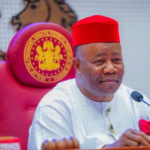law reeport
Mandatory statutory provision can’t be waived….SC
In the Supreme Court of Nigeria HOLDEN AT ABUJA Friday, June 5, 2015
Suit number: SC.99/2009
Between
ALHAJI (DR) ADO IBRAHIM…. Appellant
and
1. ALHAJI MAIGIDA U. LAWAL
2. ALHAJI ISA SANNI OMOLORI
3. ENGINEER IDRIS SERIKI
4. COMRADE NWAHA MOMOH SANNI
5. MILITARY ADMINISTRATOR, KOGI STATE
6. ATTORNEY GENERAL, KOGI STATE……………….. Respondents
IBRAHIM TANKO MUHAMMAD, JSC; MUHAMMAD SAIFULLAH MUNTAKA-COOMASSIE, JSC; OLABODE RHODES-VIVOUR, JSC; NWALI SYLVESTER NGWUTA, JSC; JOHN INYANG OKORO, (JSC)
Judgement (Delivered By JOHN INYANG OKORO, JSC)
This appeal is against the judgment of the Court of Appeal, Abuja delivered on 12th January, 2009 wherein the lower court affirmed the decision of the trial court entering judgment in favour of the 1st – 4th respondents (as plaintiffs). A synopsis of the facts leading to this appeal will suffice.
The stool of the paramount ruler of Ebiraland in Kogi State became vacant on the 10th of July, 1996 following the demise of Ohinoyi Muhammed Sani Omolori. At the time of this vacancy, the relevant statute regulating ascension to the stool of Ohinoyi of Ebiraland was the Kogi State Chiefs (Appointment, Deposition and Establishment of Traditional Councils) Law, 1992.
After the performance of the burial rites, interested Ebira sons started submitting applications for the vacant stool. The applications received by the Ebira Area Traditional Council which was the body of kingmakers included the applications of some of the respondents.
On the 6th of May, 1997, the military administrator of Kogi State enacted an edict known as “Procedure for Ascension to the throne of Ohinoyi of Ebiraland Edict No. 3 of 1997” which came into force on the 6th of May, 1997.
On 9th of May, 1997, the Ebira Area Traditional Council met to deliberate upon the applications already submitted by interested candidates to the vacant stool. The council thereafter shortlisted three names including the appellant to the military administrator for appointment to the vacant stool. The Administrator thereafter appointed the appellant as the Ohinoyi of Ebiraland on the 2nd of June, 1997.
The respondents, who are sons of Ebiraland interested on the stool of the Paramount Ruler felt aggrieved by the failure of the appointment to follow due process culminating in depriving them of the opportunity of vying for the status/post and alleged breach of several provisions of the laws applicable to the chieftaincy stool.
On 6th March, 1998, the 1st – 4th respondents as plaintiffs along with two others now deceased instituted this action against the appellant and the 5th & 6th respondents challenging the appointment of the appellant as the Ohinoyi of Ebiraland.
The 1st issue is probing whether the trial court had jurisdiction to entertain this matter when, according to the appellant, the mandatory pre-condition laid down in Section 4(4) of the Kogi State Chiefs Law, 1992 was not complied with.
Issue two challenges the competency of the suit in view of Section 2(a) of the Public Officers Protection Act. The 1st – 4th respondents fused these two issues into one in their issue No. 6.
On the first issue, the learned counsel for the appellant, Kehinde Ogunwumiju Esq, leading other counsel, submitted that by virtue of the Kogi State Chiefs (Appointment, Deposition and Establishments of Traditional Councils) Law 1992 (hereinafter referred to as KSCL 1992), each of the 1st – 4th respondents as plaintiffs ought to have deposited a mandatory fee of N20,000.00 before instituting this action but that they failed to comply with the said provision. According to learned counsel, due to the failure of the 1st – 4th respondents to comply with the said law, the two lower courts lacked the jurisdiction to entertain the suit or enter judgment in favour or against any of the parties. Referring to Section 4(4) of the KSCL 1992 and the 7th Schedule thereof, learned counsel submitted that the words in the section are clear and unambiguous and ought to be given their ordinary grammatical meaning.
On the second issue, learned counsel submitted that this action was filed properly to challenge the appointment/approval of the appellant as the Ohinoyi of Ebiraland by the Military Governor of Kogi State. That considering the wordings of Section 2(a) of the Public Officers Protection Act, it is obvious that in appointing the appellant as the Ohinoyi of Ebiraland, the Kingmakers as well as the Military Administrator of Kogi State acted pursuant to the relevant provisions of the KSCL 1992 and so acted as public officers.
I shall first resolve the issue relating to the statute of limitation as it affects this case. Both parties to this appeal agree that the event which triggered off this suit at the High Court of Kogi State was the issuance of a letter of appointment as the Ohinoyi of Ebiraland to the appellant by the 5th respondent – the Military Administrator of Kogi State on 2nd June, 1997. The 1st – 4th respondents were aggrieved but did not file the suit giving birth to this appeal until the 6th of March, 1998, about nine months after the cause of action arose. Again, there is no dispute as to when the cause of action arose and when the suit was filed as there are facts engraved in the record of appeal to that effect.
Before I consider the specific complaints of the 1st – 4th respondents against the applicability of the Public Officers Protection Act to this suit, let me take the liberty of restating the meaning, purport and applicability of the Act. Section 2(a) of the Public Officers Protection Act provide.
Now, applying the above principle to the case at hand, there is no doubt that the 1st – 4th respondent’s complaint in the main is against the appointment of the appellant as the Ohinoyi of Ebiraland by the Military Administrator of Kogi State vide his letter of 2nd June, 1997 to that effect. Was the Administrator a Public Officer? The simple answer is yes. Was he performing a public function?
The answer is yes. Was he acting under any law made in the state? Of course he acted pursuant to both the Chiefs Law of Kogi State and the “Procedure for Ascension to the throne of Ohinoyi of Ebiraland -No. 3 of 1997.
First, it was argued by the learned counsel for the 1st -4th respondents that only the 5th and 6th respondents could raise the issue as the Public Officers Protection Act was made for their benefit only. My simple answer to this argument is that the issue raised here is jurisdictional in nature and as was pointed out by the learned counsel for the appellant in his reply brief, issue of jurisdiction is so fundamental that any party to a dispute can raise same. It is often said that jurisdiction is a threshold issue which can be raised at any stage or time of the proceedings by any party or even by the court suo motu.
As rightly observed by the learned counsel for the appellant, if the court, as an impartial umpire, can raise the issue of jurisdiction suo motu and even decide on it provided it affords the parties their right of fair hearing, how much more a defendant whose duty it is to defend the suit? I agree that the appellant was entitled to raise that issue. It was not only for the 5th and 6th respondents alone to raise the issue as even the court can lawfully do so.
The second legal mine set to ambush, explode and stop the application of the Public Officers Protection Act to is proceeding is that the 5th and 6th respondents had waived their right to do so, for, though they pleaded same in their statement of defence, have not fought it to this court. Without much ado, I find it difficult to accept this proposition. The reason is not far-fetched. Courts are creatures of statutes predicated on the constitution with their jurisdiction clearly stated or prescribed therein. In view of this state of affairs, it is quite obvious that no court can assume jurisdiction except it is statutorily endowed as jurisdiction cannot be implied nor can it be conferred by agreement of parties.
Let me emphasize the fact that a mandatory statutory provision cannot be waived. The word “shall” used in Section 2(a) of the Public Officers Protection Act denotes mandatoriness and leaves no room for discretion.
Again, the 1st – 4th respondents argued that failure of the appellant to plead the statute of limitation in his statement of defence precludes him from ventilating same before this court.
The appellant is right here. The position of the law on raising of fresh issue on appeal is quite clear. It is that no substantial point of law which has not been taken in the court below will be allowed to be raised for the first time before the Supreme Court except under special circumstances.
The above position of this court tallies with what has happened in the instant appeal and I have no reason to depart from it. The appellant, having sought and obtained leave to raise the issue of statute of limitation, has properly brought the matter to the front burner and cannot be faulted in any material particular.
Finally, the learned counsel for the 1st – 4th respondents submitted that the statute of limitation does not apply to chieftaincy matters. This is not correct as there is no law which supports that position.
As can be seen from the extant decision of this court, not even the provisions of the constitution voids the limitation period in chieftaincy matters. The argument of the 1st – 4th respondents in this issue is, as can be seen, of no moment.
Having debunked all the road blocks set up by the 1st – 4th respondents against the applicability of the Public Officers Protection Act to this proceeding, it remains for me to state clearly that the limitation law was lawfully and properly raised before this court by the appellant. The sum total of all I have endeavoured to say above is that the suit of the 1st – 4th respondents before the trial High Court was statute-barred and had robbed the trial court of the jurisdiction to entertain the matter. In the same vein, the lower court had no jurisdiction to hear and determine an appeal arising from a judgment generated from the High Court which had no jurisdiction to entertain same. Accordingly, both the judgment of the High Court of Kogi State delivered on 3rd April, 2006 and that of the Court below delivered on 12th January, 2009 are hereby set aside. The appeal is hereby allowed.
Consequently, the suit of the 1st – 4th respondents at the trial High Court of Kogi State is hereby struck out for want of jurisdiction.
Having struck out the suit, there remains nothing to be said in respect of the other issues in this appeal including the cross appeal which is also struck out for the same reason. I make no order as to costs.
 Join Daily Trust WhatsApp Community For Quick Access To News and Happenings Around You.
Join Daily Trust WhatsApp Community For Quick Access To News and Happenings Around You.



